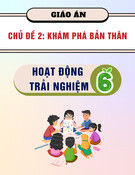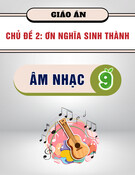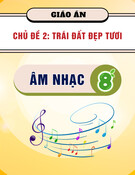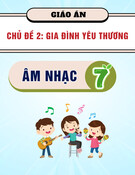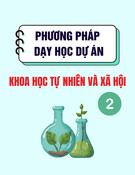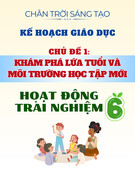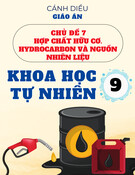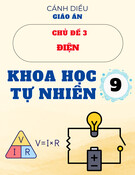OPTIONAL LESSON 1
TENSE REVISION
1. Aims: Revise and work with exercises on present simple and past simple tense
2. Objectives:
By the end of the lesson, Students will be able to:
(cid:0) Language
Know how to use the present simple and past simple tense correctly through some exercises
and use these tenses to solve some communicative tasks.
(cid:0) Skill: reading, writing
(cid:0) Attitude: help Sts be more interested in learning English grammar
3. Teaching Aids: handouts
4. Teaching methods: communicative approach, Game organizing, groupworking, student reports
by individual…
5. Anticipated problems:
There may be time left, so the teacher should prepare an extra reading exercise
In case, the teacher lacks time, the teacher should reduce the time for practicing
6. Procedure
Teacher’s activities Students’ activities
WARM UP (7min) Greeting Checking students’ attendance
Greeting and the monitor inform the whole class’s attendance. Slap the board Listen to the rule and Write down some verbs in past simple tense on the play the game board
T speak aloud some verbs in present tense and ask Sts to run as quickly as possible to the board to slap that verb in past simple tense.
Which group has the quickest and most correct answer
will be the winner. Revise the form, use of these two tenses
PRESENTATION: (5min) Listen to the teacher T calls on some Sts to elicit the form, use and
recognized marks of the two tenses. Do the exercises T explains some difficult points if necessary.
PRACTICE (20min) Check the exercise
Asks Sts to do some exercises on the two tenses
Calls on some Sts to go to the board and give the answer
Checks the exercise by eliciting the comments from Sts
and then gives the correct answers. Suggested answer:
I. Put the verbs in bracket in the present simple tense
1. My teacher (have)……… long hair.
2. They (not want )………to play the love games
3. Marry (be) …….. an English person? Yes, she is.
4. Birds (build) …………….their nests in the summer and (fly)
…………………. to the south in winter.
5. The new comers (not know)………… the rules of the club.
6. How often John (go)………… to the library? No, he (not
like)………….to read books. He only (want)………..to listen
to music.
7. What you often ( have)………. for Breakfast? – I (not know)
………I (not often prepare)………….breakfast. My mother
(prepare)……………it.
8. Martin (live)………..in a small flat. He and his wife (always
get)……….up early to water flowers.
9. What the new chairman (do)…………now. I (see)…………
that he (be)……..very busy.
10. The sun (set)………………… in the West and (rise) in the
East.
11. Mr. Green always (go) …………………..to work by bus.
12. My little sister (drink) ………………….milk everyday. I. 1. has 2. don’t want 3. is 4. build – fly 5. don’t know 6. does John go – doesn’t like – wants 7. do you often – don’t know – don’t often prepare – prepares 8. lives – always get 9. does the new chairman do – see – is 10. sets – rises 11. goes 12. drinks 13. do you often read 14. has 15. buys 16. gets 17. works 18. circles 13. How often (you/read) ………………..a newspaper?
14. She (have) …………………coffee for breakfast every
morning.
15. She sometimes (buy) …………………vegetables at this
market.
16. The weather generally (get) ……………quite hot in July
and August.
17. Michael (work)…………… thirty eight hours a week.
18. The earth (circle)……………. the sun once every 365 days.
II. Put the verbs in brackets into the past simple tense
1. We (study)……………………… a very hard lesson the day
before yesterday.
2. My wife and I (travel) ………………………..to Mexico by II. 1. studied 2. traveled 3. had 4. did you do – stayed did 5. was – heard – cried
air last summer.
3. I (have)…………………….. a little trouble with my car last
week.
4. What you (do) ……………yesterday?
I (stay)……………. at home and (do)………………. my
homework.
5. She (be) ……….so happy when she (hear)…………… the
news that she (cry)…………..
6. The plane (stop)…………… at a small town. It then (take) 6. stopped – took 7. won 8. agreed 9. taught 10. was 11. went 12. didn’t know – was 13. did Mary come 14. did not drink 15. did you buy …………….off immediately after refuelling.
7. She (win)…………. the gold medal in 1986.
8. Daisy (agree)……………. with other members in the last
meeting.
9. Mary (teach)…………… English in this school 5 years ago.
10. Tom (be) …………in Brazil last summer holiday.
11. You (go) ……………..to the cinema with Mary last night?
12. I (not know)……………….. how to play the piano when I
(be)………… young.
13. What time Mary (come)……………?
14. I wasn’t thirsty, so I (not/drink)………………. anything.
15. How many notebooks you (buy) ………………….last
year?
PRODUCTION (9min) Work in pairs and do
Ask Sts to work in pairs and think of at least 5 things you the task
often do and 5 things you did yesterday and share with their Report friends.
Listen to the feedback Calls on some Sts to report what they have been shared from
from teacher their friends in front of the class.
Elicits comments from other Sts and give feedback.
Homework (2 min) Revise the two tenses: present simple and past simple tense
Prepare for the next lesson: Unit 2: Part A Reading
Comments (2 min)
- Attendance - Participation Strong points and weak points
OPTIONAL LESSON 2:
PRACTICING READING SKILL
1. Aims: Practice to develop reading skills through different reading exercises
2. Objectives
By the end of the lesson, Students will be able to:
(cid:0) Skill: develop such reading micro skills as scanning for specific information, intensive
reading for details, and guessing meaning in context.
(cid:0) Language: broaden their knowledge of some topics related to routine activities or school,
class…
(cid:0) Attitude: help Sts be more interested in learning English through some interesting reading
exercises.
3. Teaching Aids: handouts, CD, speakers…
4. Teaching methods: communicative approach, Game organizing, groupworking, student reports
by individual
5. Anticipated problems:
The students may not finish all the exercises in class, the last exercise should be left to do at
home.
Students may get difficulty in pronunciation, teacher correct mistakes and help students with
pronunciation.
6. Procedure
Teacher’s activities Students’ activities
Greeting and the
WARM UP: (10min) Greeting Checking students’ attendance
Guess the song monitor inform the whole class’s attendance.
Ask Sts to listen to the song and find out the title of these
Divide class into 4 groups
Listen to the teacher songs and do the task
The group with the fastest and the most correct answers will
Play the music for Sts to do the task 1. My heart will go on
2. Heal the world be the winner.
3. Because I love you PRACTICE READING SKILL (30 min)
Give Sts some reading exercises to practice.
4. Take me to your heart Ask Sts to work in pairs to do the task.
T provides Sts with the background knowledge and
vocabularies to read more effectively if necessary.
Let Sts do the task in 10 minutes
Call on some Sts to give the answers in front of the class
Check and give the correct answer
I. Read the following passage then do the exercises.
Work in pairs
Every morning I get up at six. The first thing I do is to wash my dishes. Then I cook breakfast. I have breakfast at about seven fifteen a.m. Do the exercise It takes me about ten minutes to walk to school, and school
Give the answers
I go home for lunch, but this time, my sister Patricia gets the
At about six or six thirty we have dinner. Either my sister or I Check the exercise
Suggested answers:
1. F
2. F
3. T
4. She washes her dishes
begins the lesson at seven fortyfive. There are fourty pupils in my class. We study Maths, Geography, History, Music, and English. I like English best and next to that, Maths. At ten a.m we have a chance to eat an orange and some peanuts. meals. After lunch, I usually sleep for half an hour. In the afternoon, we play tennis. cook it. The meal is simpler than the midday meal. We eat fruit or rice, and sometimes we have bread and tea. Then in the evening, I do my homework and go to bed at ten p.m. * Decide the statements are True (T) or False (F). 1. I have breakfast at about seven fifteen minutes. 2. It takes me about seven fortyfive minutes to walk to school. 3. I have dinner and eat fruit or rice, sometimes bread and tea. * Answer the following questions: 4. What is the first thing the girl does when she gets up? 5. Which subjects does she like best at school? 6. What does she do before going to bed? 5. She likes English best
6. She does her homework. II. Read the passage about Mss Lan Phuong and then fill in the form. (1m) Lan Phuong was born on March 18th, 1975 in Ha Noi. She went to
Chu Van An High School and passed exams in English and French.
She worked as a teacher at Luong The Vinh high school from May Suggested answers: 2000 to September 2005. And from July 2006 to November 2010, 1. March 18th, 1975 she worked as a tourist guide. She likes listening to music and
traveling.
2. Chu Van An High School
3. teacher
4. November 2010
5. listening to music Name: Lan Phuong Date of birth: (1)……………………….. Place of birth: Ha Noi Education School attended: (2)……………………………………….. Exams passed: English and French Previous jobs:
traveling Job Date to
September 2005 (3) ……………………………..
Tourist guide (4) ……………………………. Date from May 200 0 July 200 6
Interests: (5)……………………………… and………………………..
Suggested answer: 1.A 2.A 3.A 4.B
D. play better
C. Six
III. Choose the item among A, B, C or D that best answers the question about the passage: Parents send their children to the school to prepare for the time when they grow up. Children learn their native language so that they will be able to communicate fluently with other people around them. Moreover, they can preserve the valuable culture and literature of their country. They learn foreign languages in order to benefit from other countries’ heritage. The more foreign languages they learn, the more benefits they get. Children also learn mathematics to calculate, geography to know about nature, history to know about human beings and historical events. Nearly everything they study at school has some practical uses in their life. 1. Parents send their children to the school to ……………………… A. prepare for their future B. make them grow up C. learn English 2. Why do children have to learn their native language? A. To communicate fluently with other people around them B. To benefit from foreign countries’ heritage C. To know about their nature D. to learn foreign languages 3. How many school subjects are mentioned in the passage? A. Four B. Seven D. Five 4. According to the passage, children learn history to know about ……………………….. A. the mankind C. events of the history B. people and historical events D. practical uses in life What’s her name? Where does she live? When was she born? ……
HOMEWORK (3 min) Use information about Mrs Lan Phuong in part II to make as
many questions about her as possible
Give some guidance: use Wh questions: What, Where,
When….Or use Yes/No questions
COMMENT (2 min) - Attendance - Participation Strong points and weak points
OPTIONAL LESSON 3
PRACTICE ON WRITING SKILLS
1. Aims: Revise grammatical items on verbs to develop writing skill by writing sentences,
expressing ideas, making sentences
2. Objectives
By the end of the lesson, Students will be able to:
(cid:0) Skill: develop listening and writing through singing exactly the lyric of the song “Take me to
your heart” and use the gerund and toinfinitive to rewrite sentences or expressing ideas,
making sentences as required.
(cid:0) Language: broaden their vocabulary related to the subject of the song “love”
(cid:0) Attitude: help Sts be more interested in learning English, be more confident in expressing
ideas.
3. Teaching Aids: handouts, cassette, speaker.
4. Teaching methods: communicative approach
5. Anticipated problems:
Students may be shy to talk about love in the song, they may lack confidence in expressing
their ideas or presenting their exercises
6. Procedure
Teacher’s activities Students’ activities
WARM UP: (10min) Greeting Checking students’ attendance Greeting and the monitor inform the whole class’s attendance.
Ask students to read through the song and guess the title of
Deliver handouts for the students Listen to the teacher and do Don’t forget the lyrics the task
the song.
Ask Sts to fill in the blanks to complete the lyrics.
Work individually and then work in pairs to compare the answer Play the music for Sts to do the task
Ask the students to compare their answers Answer: Take me to your heart Play the music once again for the students to check by themselves
Call students to read or write their answers on the board
Play the music and check the answer
Comment and give mark
Ask students to speak out their feeling of the song 1. go 2. street 3. people 4. world 5. heart 6. soul 7. true 8. forever
Ask students to look at some sentences in the song:
9. heart 10. + Trying to forget but I can’t let go
+ Don't need too much talking without saying anything
11.
Ask students to recall how to use some verbs: try, let, preposition “without” and make sentences using these words.
Ex: I try to learn English well
She went out without saying anything
12. ……
13.
MAIN CONTENT:
Part 1: Revise grammatical items
Ask students to do the exercise
Put the verbs in the brackets into the correct form (gerund or 14.
infinitive)
1. I am looking forward to (see)________ you.
15. 2. He is tired of (walk)__________ to school.
3. I arrange (meet) __________them here.
4. I wish (see)__________the manager. 16.
5. Don’t forget (lock)____________the door before
(go)__________to bed.
6. He tried (explain)____________but she refused
(listen)____________. 17.
7. At dinner, she annoyed me by (smoke)__________ between
the courses.
8. You are expected (know)_________ the safety regulations
of the college.
18. 9. He decided (disguise) ____________himself by
(dress)______as a woman
Ask Sts to work in pairs to compare their answers
10. Would you mind (tell) _________me the time?
19.
Call on some Sts to give the answers in front of the class s o ul h a n d s st ar m o u nt ai n m o o n s k y fr ie n d s a n yt hi n g h e ar t s o ul
Check and give the correct answer 20.
21. Part 2: Writing Using what they have recalled of using verb forms in part 2 and do exercise in part 3:
Rewrite the following sentences using the cues given in the way that their meaning is the same as the given ones. 1. Shall we go for a walk?
What about…………………………………………? 22. 2. Why don’t we visit our teacher?
I suggest ………………………………………………………… 3. I am very pleased that we shall meet again soon.
I am looking ………………………………… 4. 23.
It is really quite easy to learn English. Learning …………………………………………… I don’t want to go to the movie tonight. 5.
6. 24. I don’t feel like ………………………………………………….. It is not a good idea to travel during the rush hour. It’s better to avoid…………………………………………..
7. Could you turn the radio down, please? Would you mind……………………………….?
25.
tr u e f o re v er b ri n g h e ar t s o ul h a n d s Call some students to write on the board their answer Others students give comments Teacher give comments and marks Ask students to make sentences using the verbs in this exercise. Teacher listen, comment, give marks
Students make sentences using “try, let, without” Homework (3 min) Use “what about, suggest, look forward to, feel like, avoid, mind,
It’s + adj + toV” to write make sentences and write to their Part 2: notebook.
Provide some guidance if necessary
Comments (2 min)
- Attendance - Participation Strong points and weak points
1. seeing 2. walking to meet 3. to see 4. to lock – going 5. 6. to explain – to listen 7. smoking to know 8. 9. to disguise – dressing 10. telling
Suggested answers:
1. …going for a walk?
2. going to visit our teacher
3. forward to meeting you again soon
4. English is really quite easy
5. going to the movie tonight
6. travelling during the rush hour.
7. turning the radio down
students raise their hands and make sentences
Handout
WARM-UP ACTIVITY: Listen to the song and fill in the blanks with the missing words
_________________________________
(Michael Learns to Rock)
Standing on a ………13…… high
Looking at the …14… through a clear blue
Hiding from the rain and snow
……15
Trying to forget but I won't let ……. 1
I should go and see some ………16….
Looking at a crowded ……………….2
But they don't really comprehend
Listening to my own heart beat
Don't need too much talking without saying
So many ……3…… all around the ……4……
……………….17.
Tell me where do I find someone like you girl
All I need is someone who makes me wanna
sing
Take me to your …5…… take me to your …
Take me to your …18….. take me to your …19…
6…
Give me your hand before I'm old
Give me your hand before I'm old
Show me what love is - haven't got a clue
Show me what love is - haven't got a clue
Show me that wonders can be ……20…..
Show me that wonders can be ………7…
They say nothing lasts ……….21
They say nothing lasts ……………. 8
We're only here today
We're only here today
Love is now or never
Love is now or never
22……….. me far away
Bring me far away
Take me to your ….23.... take me to your …
Take me to your……9.. take me to your …
24…
10…..
Give me your ………25.. and hold me
Give me your ………11… and hold me
Show me what love is - be my guiding star
Show me what love is - be my guiding ……12
It's easy take me to your heart
It's easy take me to your heart
Part 2: Put the verbs in the brackets into the correct form (gerund or infinitive)
11. I am looking forward to (see)________ you.
12. He is tired of (walk)__________ to school.
13. I arrange (meet) __________them here.
14. I wish (see)__________the manager.
15. Don’t forget (lock)____________the door before (go)__________to bed.
16. He tried (explain)____________but she refused (listen)____________.
17. At dinner, she annoyed me by (smoke)__________ between the courses.
18. You are expected (know)_________ the safety regulations of the college.
19. He decided (disguise) ____________himself by (dress)______as a woman
20. Would you mind (tell) _________me the time?
Part 3: Rewrite the following sentences using the cues given in the way that their meaning is the same as the given ones.
8. Shall we go for a walk?
What about…………………………………………………………………………………?
9. Why don’t we visit our teacher?
I suggest …………………………………………………………………………………
10. I am very pleased that we shall meet again soon.
I am looking …………………………………………………………………………….
11. It is really quite easy to learn English.
Learning ………………………………………………………………………………….
12. I don’t want to go to the movie tonight.
I don’t feel like …………………………………………………………………………..
13. It is not a good idea to travel during the rush hour.
It’s better to avoid………………………………………………………………………..
14. Could you turn the radio down, please?
Would you mind………………………………………………………………………….?
OPTIONAL LESSON 4
PRACTICING ON LISTENING SKILL
1. Aims: Develop listening skill through the listening task for specific information
2. Objectives
By the end of the lesson, Students will be able to:
(cid:0) Skill: apply techniques in doing listening tasks; develop listening skills through listening
and understanding the message of the song “Heal the world”
(cid:0) Language: broaden their vocabulary related to people’s background, broaden their
knowledge of racial discrimination in the world.
(cid:0) Attitude: help Sts be more interested in learning English and be more confident in
communicating with more vocabulary and improving listening & reading competence
3. Teaching Aids: handouts, CD, speakers…
4. Teaching methods: communicative approach
5. Anticipated problems:
Students may have difficulty realising the sounds in listening task teacher may give
students multiple choice to make it easier.
6. Procedure
Teacher’s activities Students’ activities
Greeting and the
WARM UP: (8 min) Greeting Checking students’ attendance
Riddle: monitor inform the whole class’s attendance.
1. What is black when it is clean and white when it is dirty?
Listen to the teacher and try to find the answer as quick as possible:
2. What will make more noise in your house than a dog?
3. Which letter is always trying to find reasons?
1. the blackboard
2. two dogs Ask students to listen carefully to the riddle and find out the answer Check and give them encouragement
3. “y” why
PRACTICE LISTENING SKILL
Listen and fill in the table with information about Alan:
Profession
1
Age
2
Activity 1: (10 min)
Gets up at
3
Listen carefully Answer the questions orally 1 student write on board Others give comments
Goes to bed at
4
Has lunch in
5
Comes home at
6
7
In the evening he goes to Play the cassette twice and ask students to listen carefully
Answer: 1. lorry driver 2. 25 3. 6:00 4. 10:00 5. a transport café 6. 5:00 7. the pub Call on some Sts to give the answers in front of the class
Ask 1 student to write the answer on the board
Play the cassette again to check and give the correct answer
Give students comments, marks and encouragement
Listen and fill in the table with the right words:
Activity 2: (17 min) Answer:
Deliver the handouts to the students, ask the students to look
through the lyrics and listen to the cassette to do the task
Play the cassette twice
Ask students to give their answers
Ask 2 students to go to the board and write down their answers
Other students will check and give comments
Play the cassette again and check the answers
Comment and give marks.
1. place 2. brighter 3. try 4. cry 5. sorrow 6. better 7. human race lie 8. 9. fear 10. dream 11. joyful 12. believed 13. earth 14. spirits 15. tears 16. children
Homework (2 min)
Revise the lesson Learn to sing the song in the lesson
Comments (2 min)
- Attendance - Participation Strong points and weak points
Listen and fill in each blank with the missing words
Handout
Heal the world
And the __10_____ we would conceived in Will reveal a _11_____ face And the world we once _12______ in Will shine again in grace Then why do we keep strangling life Wound this _13____, crucify it's soul
Though it's plain to see, this world is heavenly Be God's glow There's a _1____ in your heart And I know that it is love And this place could be much _2_____ than tomorrow And if you really __3_____ You'll find there's no need to _4_____ In this place you'll feel There's no hurt or __5_____ There are ways to get there If you care enough for the living Make a little space, make a _6____ place
Heal the world Make it a better place For you and for me and the entire _7_____
There are people dying If you care enough for the living Make a better place For you and for me
We could fly so high Let our _14_____ never die In my heart I feel You all are my brothers Create a world with no fear Together we'll cry happy _15____ See the nations turn Their swords into plowshares We could really get there If you cared enough for the living Make a little space to make a _6___ place
(Heal the world Make it a better place For you and for me and the entire _7_____
There are people dying If you care enough for the living Make a better place For you and for me If you want to know why There's a love that cannot _8___ Love is strong It only cares for joyful giving If we try we shall see In this bliss we cannot feel _9____ or dread We stop existing and start living Then it feels that always Love's enough for us growing Make a better world, make a better world
Heal the world Make it a better place For you and for me and the entire _7____ Heal the world Make it a better place For you and for me and the entire _7_____)*3
There are people dying If you care enough for the living Make a better place For you and for me (You and for me / Make a better place)*3 (You and for me / Heal the world we live in You and for me / Save it for our _16_____)*3
OPTIONAL LESSON 5
PRACTICING ON SPEAKING
1. Aims:
Develop speaking skill through discussing and talking about food, poisonous food
2. Objectives
By the end of the lesson, Students will be able to:
(cid:0) Skill: develop speaking and listening skills through talking and listening to each other
(cid:0) Language: broaden their vocabulary in the topic: food and health
(cid:0) Attitude: help Sts be more confident in talking about the topic.
3. Teaching Aids: handouts, : audio, poster, …
4. Teaching methods: communicative approach
5. Anticipated problems:
Students may have difficulty in using the correct words to express their ideas. T goes around
and provide assistance.
6. Procedure
Teacher’s activities Students’ activities
Listen to teacher’s instruction WARM UP: (7 min) Greeting Checking students’ attendance and request
Follow the order as quick as Change your seats possible Teacher make requests like:
Change your seats if you are wearing …..
Decide who is out after each turn
PRACTICE ON SPEAKING (35’)
Provide students with some pictures and ask sts to
work out the problems mentioned: Chemicals in food
Poisonous fruits
Unhealthy fastfood
Discuss in groups Discuss the causes and effect of these types of food
Call some sts to summarize what they have worked
out.
Ask students to find out more types of food that are
not good for people’s health:
Discuss in groups
Ask students to discuss to find out the solution to
prevent food poisoning
Ask students to report what they have
Report individually. HOMEWORK (1 min) Revise the lesson
Comments (2 min)
- Attendance - Participation
Strong points and weak points
OPTIONAL LESSON 6
GRAMMAR: PRESENT PERFECT AND PRESENT PERFECT PASSIVE
1. Aims: Revise and work with exercises on present perfect and present perfect passive
2. Objectives:
By the end of the lesson, Students will be able to:
Know how to use the present perfect and present perfect passive correctly through some
(cid:0) Language
exercises and use these tenses to solve some communicative tasks.
(cid:0) Skill: reading, writing
(cid:0) Attitude: help Sts be more interested in learning English, be more confident in expressing
their ideas.
3. Teaching Aids: handouts
4. Teaching methods: communicative approach, groupworking
5. Anticipated problems:
The students may be confused to find out objects when changing the active sentences into the
passive ones or they may get difficulty using the irregular verbs correctly.
6. Procedure
Teacher’s activities Students’ activities
WARM UP (7min) Greeting Checking students’ attendance
Greeting and the monitor inform the whole class’s attendance. Matching (PART A)
Listen to the teacher and give
their answer
Suggested answer:
1. The boy throws a ball 2. They arrive at the hotel 3. The boy comes out of the water
4. The boy falls asleep 5. She jumps into the water 6. Tracy builds a sandcastle 7. The bear eats some food 8. He catches a hat 9. She eats strawberry 10. The girl falls
Ask students to look at the pictures and match them to the sentences given Call some students to present their answers One student goes to the board and write down the number of pictures and sentences Give feedback
1. The boy has thrown a ball 2. They have arrived at the hotel PRESENT PERFECT: (15 min) 3. The boy has come out of the water
T calls on some Sts to elicit the form, use and recognized marks of the present perfect T explains some difficult points if necessary. Do PART B: Change the sentences in part A into the
4. The boy has fallen asleep 5. She has jumped into the water
present perfect tense: 6. Tracy has built a sandcastle 7. The bear has eaten some Real application: Tell the class 3 activities that you have food done.
T calls on some Sts to elicit the form, use and recognized marks of the present perfect
PRESENT PERFECT PASSIVE: (17 min) 8. He has caught a hat 9. She has eaten strawberry 10. The girl has fallen
Active : S + have / has + P2 + O
Passive : S + have / has + been + P2 + by….
Example: She has told a funny story A funny story has been told by her.
T explains some difficult points if necessary. Change the sentences in part B into the present perfect
Call some students to do the task, others give comments Give feedback Ask students to apply this type of sentence in their real
passive, some sentences can not be changed, point them out, explain the reasons.
situations
Listen to the students and teacher Sentences 2,3,4,5,10 can’t be changed into the passive voice because they don’t have any object, the verbs in these sentences are intransitive verbs. 1. A ball has been thrown by the boy. 6. A sandcastle has been built by Tracy. 7. Some food has been eaten by the bear. 8. A hat has been caught by him 9. Strawberry has been eaten by her.
HOMEWORK (4 min) Put the verbs in the correct tenses and change the sentences into the passive voice if possible 1 . She ……………………..(wait) for two hours to see you. 2. She …………………………………..(be) to America. 3. John ………………………..(see) that film several times. 4. They ………………..……(live) in this street for a long time. 5. She ……………….……..(not speak) to me since last week. 6. We ………………..(study) every lesson in the book, so far. 7. I …………………………….(have) three colds this winter. 8. Up to now, John ……………………….(work) very hard Suggested answer: 1. has waited 2. has been 3. has seen 4. have lived 5. hasn’t spoken 6. have studied 7. have had
8. has worked Sentence 3, 5, 6 can be changed into the passive voice COMMENTS (2 min) - Attendance - Participation Strong points and weak points
PTIONAL LESSON 7:
PRACTICING READING SKILL
1. Aims: Practice to develop reading skills through different reading exercises
2. Objectives
By the end of the lesson, Students will be able to:
(cid:0) Skill: develop such reading micro skills as scanning for specific information, intensive
reading for details, and guessing meaning in context.
(cid:0) Language: broaden their knowledge of some topics related to routine activities or school,
class…
(cid:0) Attitude: help Sts be more interested in learning English through some interesting reading
exercises.
3. Teaching Aids: handouts, CD, speakers…
4. Teaching methods: communicative approach, Game organizing, groupworking, student reports
by individual
5. Anticipated problems:
The students may not finish all the exercises in class, the last exercise should be left to do at
home.
Students may get difficulty in pronunciation, teacher correct mistakes and help students with
pronunciation.
6. Procedure
Teacher’s activities Students’ activities
Greeting and the
WARM UP: (10min) Greeting Checking students’ attendance
Guess the song monitor inform the whole class’s attendance.
Ask Sts to listen to the song and find out the title of these
Divide class into 4 groups Listen to the teacher
and do the task
songs
1. Let the music heal your soul Play the music for Sts to do the task
The group with the fastest and the most correct answers will
2. Heal the world
be the winner. 3. Because I love you
PRACTICE READING SKILL (30 min) 4. Take me to your heart Give Sts some reading exercises to practice.
Ask Sts to work in pairs to do the task. Work in pairs
Do the exercise T provides Sts with the background knowledge and vocabularies to read more effectively if necessary.
Give the answers Let Sts do the task in 10 minutes
Call on some Sts to give the answers in front of the class Check the exercise Check and give the correct answer
Suggested answers:
; 2/ T ; 3/ F ; 1/ F ; 5/ N ; 6/ T ; 4/ F 7/ T ; 8/ F ; 9/ T ; 10/ F 11/ F ; 12/ T ; 13/ T ; 14/ T ; 15/ F
ả ị
ể ữ ế ươ ng
ự ố instruments such as chimes (chuông hòa âm, ẻ ồ ế
I.Read the passage and statements below carefully, and then say whether the statements are true (T), false (F) or not given (N): Music is part of every culture on Earth. Many people feel that music makes life worth living. We can make music ourselves if we play an instrument or sing. We can hear music on CDs and on radio or television. Music gives us pleasure. It can cheer us up, excite us, or soothe us. WHAT IS MUSIC? Music can be happy, sad, romantic, sleepy, spinetingling, healing —all kinds of things. But what is it? Some people define it as an artful arrangement of sounds across time. Our ears interpret these sounds as loud or soft, high or low, rapid and short, or slow and smooth. The sounds need to continue for a time in some sort of pattern to become music. Music, like language, is a uniquely human form of communication. As with language, there are many different kinds. In North America, people listen to jazz, rock, classical, folk, country, and many other kinds of music. Each kind of music has its own rules and “speaks” to us in its own way. What we think of as music depends on where we live. What Americans are used to listening to might sound strange to someone from another culture, and vice versa. It might not even sound like music. In Indonesia, gamelan orchestras play music on gongs, drums, and xylophones. These aren’t the instruments you’d find in a typical orchestra in North America. Today, modern communications make it possible for us to listen to music from all over the world. Music from one part of the world influences music from another part. For example, gamelan music from Indonesia influenced 20thcentury American composers such as John Cage. New vocabulary: to soothe (v.): làm d u, làm nguôi (tình c m…) spinetingling (adj.): very special and exciting ể ữ ệ healing (adj.): đ ch a b nh, đ ch a v t th gamelan orchestra (n.): Indonesian percussion orchestra: an Indonesian orchestra that consists mainly of percussion (s đánh ự tr ng, s gõ mõ) chuông chùm), gongs (cái c ng; cái chiêng, k ng), and wooden ộ ầ ỗ xylophones (đàn phi n g , m c c m) 1/ Music is part of every culture on all the planets. 2/ Music is considered one important thing which makes life fun and beautiful.
3/ Everyone can make music. 4/ You can see music everywhere. 5/ There are many kinds of music in Vietnam. 6/ We can feel happy when we hear music. 7/ Music can be many kinds of things. 8/ People have the same definition of music. 9/ Sometimes the sounds of music can be slow. 10/ People know all kinds of music in the world. 11/ Everyone understands music the same way. 12/ In different places there are different music instruments. 13/ Nowadays we find it easier to listen to music. 14/ Music from one place is influenced by others from other places. 15/ American music influences Indonesian music a lot.
Suggested answers:
1/ D. across 2/ A. too 3/ A. Earth 4/ B. change 5/ C. century 6/ C. sound 7/ D. image 8/ D. think 9/ A. music 10/ C. listening 11/ A. and 12/ C. list 13/ D. works 14/ B. as 15/ D. never
ạ ừ ưở ặ ng
ả ụ ụ ậ ả ẩ ộ ọ
ư ừ ng ch ng nh ẻ ế ừ …… ờ
II/ Read the following passage carefully, and then select the best option A, B, C or D to complete it: Music, artful arrangement of sounds (1) _______ time. This definition is obviously very broad, but a narrower one would exclude (2) _______ much. Music is part of virtually every culture on (3) _______, but it varies widely among cultures in style and structure. Definitions of music can (4) _______ dramatically over a short time, as they have across the world during the 20th (5) _________. Can music exist without (6) _______? Some philosophers argue that music should be defined as a kind of “mental (7) _______” and that the physical aspects of sound are simply byproducts of this image. If you (8) _______ you can have a musical experience by imagining the sound of a piece of music, then you think (9) _______ can exist without sound. But most musical experiences involve producing or (10) _______ to physical characteristics of sound such as pitch and timbre (quality comparable to texture or color in sight). Is the taperecorded sound of a large metalstamping machine music? Are 4 minutes (11) _______ 33 seconds of silence music? Is the activity of reading a (12) _______ of hundreds of seemingly unrelated objects, activities, and states of mind music? Each of these “(13) _______”, as well as many other sounds (or nonsounds), has been copyrighted (14) _______ a musical composition, performed, and recorded in the 20th century. One of the legacies of 20thcentury music is to have blurred the definition of music as (15) _______ before. New vocabulary: to exclude (v.): ngăn ch n, lo i tr , không cho (ai…) h ề (quy n…) byproduct (n.): s n ph m ph , h u qu ph ủ pitch (n.): đ cao (c a gi ng…) ắ ạ timbre (n.): (âm nh c) âm s c ẻ ưở seemingly (adv.): có v , ra v , t ả legacy (n.): tài s n k th a, gia tài ờ to blur (v.): làm m đi, che m C. along D. across A. through B. over 1/ A. too B. so 2/ C. very D. enough A. Earth B. the moon C. stars D. the sun 3/ A. vary B. change 4/ C. remain D. stay
C. or D. so C. list D. menu C. words D. works C. such as D. for example C. century D. decade A. year B. month 5/ A. accent B. voice C. sound D. noise 6/ A. drawing B. painting C. picture D. image 7/ C. see D. think A. know B. say 8/ 9/ C. culture D. images A. music B. people 10/ A. reading B. speaking C. listening D. writing 11/ A. and B. but 12/ A. title B. book 13/ A. phrases B. letters 14/ A. like B. as 15/ A. not B. seldom C. ever D. never
HOMEWORK (3 min) Write a paragraph of 150 words about the role of music to
our life
COMMENT (2 min) - Attendance - Participation Strong points and weak points
OPTIONAL LESSON 8
PRACTICING ON SPEAKING
1. Aims:
Develop speaking skill through discussing and talking about music in your life
2. Objectives
By the end of the lesson, Students will be able to:
(cid:0) Skill: develop speaking and listening skills through talking and listening to each other
(cid:0) Language: broaden their vocabulary in the topic: music
(cid:0) Attitude: help Sts be more confident in talking about the topic.
3. Teaching Aids: handouts, : audio, poster, …
4. Teaching methods: communicative approach
5. Anticipated problems:
Students may have difficulty in using the correct words to express their ideas. T goes around
and provide assistance.
6. Procedure
Teacher’s activities Students’ activities
Listen to teacher’s instruction and WARM UP: (7 min) Greeting Checking students’ attendance request
Follow the order as quick as possible Which group is faster?
T divide the class into two groups and ask each Suggested answers: group to go to the board and brainstorm words or phrases rock, pop, classical, country, rap, hip related to the topic Music hop, folk song, singers, musician, T check the answer piano, etc.
PRACTICE ON SPEAKING (35’) - Work in pairs T gives Sts a handout and ask Sts to work in pairs to ask - Ask and answer questions and answer the questions - Report the friend’s answer T ask Sts to note down their friend’s answer - Give comment Call on some sts to report their friend’s answer in front - Listen to teacher’s comment of the class.
Elicit peer’s comment and give final feedback - Listen to teacher
HOMEWORK (1 min)
Pick up one questions in the handout to write about
Comments (2 min) - Attendance - Participation
Strong points and weak points
HANDOUT Let’s talk about MUSIC
What’s your favourite kind of music?
How often do you listen to music?
Can you play a musical instrument? If so, which one?
Have you ever sung karaoke? Did you like it?
Do you like to sing? Why (not)?
Have you ever been to a concert or live show? Talk about it.
How many CDs do you have? What’s your favourite?
Do you have an MP3player? How often do you use it?
Have you ever downloaded music from the Internet? Why?
Do you prefer music in English or in your own language? Why?
Which musician or band would you most like to meet? Why?
Do you ever listen to loud music? When?
Can you dance? What’s your favourite dance?
Do you listen to music on the radio? What’s your favourite radio station?
When you listen to music, do you try to understand the words (lyrics)?
Would you like to be a famous singer? Why?
What’s your favourite singer? Why do you like him or her?
What’s your favourite band? Why do you like it?
Match instruments and pictures
Tick the music you like classical
Conversation cards
1
accordion
piano
easy listening
2
drums
saxophone
3
heavy metal
flute
tambourine
hip hop
guitar
triangle
6
jazz
4
harmonica
trumpet
R&B
organ
violin
5
rap
rock
salsa
traditional
8
11
10
12
7
9
OPTIONAL LESSON 9
VERB FORM
1. Aims: Revise and work with exercises on verb form
2. Objectives:
By the end of the lesson, Students will be able to:
(cid:0) Language
(cid:0) Know how to use different forms of verb correctly through some exercises
(cid:0) Skill: reading, writing
(cid:0) Attitude: help Sts be more interested in learning English grammar
3. Teaching Aids: handouts
4. Teaching methods: communicative approach, Game organizing, groupworking, student
reports by individual…
5. Anticipated problems:
There may be time left, so the teacher should prepare an extra reading exercise
In case, the teacher lacks time, the teacher should reduce the time for practicing
6. Procedure
Teacher’s activities Students’ activities
WARM UP (7min) Greeting Checking students’ attendance
Write down some verbs in the base form and ask sts
Greeting and the monitor inform the whole class’s attendance. Give the verb forms of the following verbs Listen to the rule and play
to give the different forms of these verbs. the game
Call on some sts to write down the answer on board.
Check the correct answers and lead to the lesson
Revise different forms of
PRESENTATION: (5min)
T calls on some Sts to elicit different forms of verb: base form, ing form, past form, past participle form, s form
verb
Listen to the teacher T explains some difficult points if necessary.
Asks Sts to do some exercises on verb form
PRACTICE (20min)
Do the exercises
Calls on some Sts to go to the board and give the
answer Check the exercise
Checks the exercise by eliciting the comments from
Sts and then gives the correct answers.
I. put the verbs in bracket in correct form Suggested answer:
ở đây có nghĩa là
ừ ộ ừ nguyên ẫ ẫ ườ ứ ế đây cô ta ch ng ki n ố ệ đ u đ n cu i vi c anh ta lái
ẫ
ở
ớ ồ ướ c đó r i).
ở ứ quá kh ). ứ ế
ẫ ấ ở ứ
ẫ ở
ệ ổ ế ả ủ ị
ượ ố ấ c c v n,
có to)
ừ có to, phía sau có by nên ể ị ộ ử ụ
ộ
ừ có to).
ừ ộ 1) That was a very strange question (ask) ......................... . 2) It was very kind of you (show).......................... the way. 3) The teacher let him (stay) ................... at home to finish the assignment. 4) It was quite a surprise (see) ........................ him again. 32) I overheard him (say) ................... that he didn’t want to learn Math. 5) She stood there and watched him (drive) ...................... away. 6) It was very difficult for her (drive)....................... the motorbike. 7) I could feel the robber (come) ...................... from the backdoor. 8) I suddenly remembered that I (forget) ................... my keys. 9) While Diana (watch) ............................. her favourite TV programme, there (be) .......................a power cut. 10) Who (drive) .................... the car at the time of the accident? 11) David (eat) .................... Japanese food before, so he (know) .......................... what to order. 12) I (do) .................... some shopping yesterday, when I (see) ....................... your friend. 13) What .............. you (do).................. when I (come) .................. to your office yesterday? 14) Laura (miss) ....................... the party because no one (tell) ......................... her about it. 15) I don’t remember (tell) ...................... of the decision to change the company policy on vacations. 16) Ms Drake expects (consult) ...................... about any revisions in her manuscript before it is printed. 17) Sally gave a good speech that I couldn’t insist (applaud) ................. loudly when she finished. 18) Tommy admitted (throw) ................. the rock through the window. 19) Paul really didn’t mind (surprise) ....................... by the party to celebrate this fortieth birthday. 20) Anne hoped (invite) ........................ to join the private club. 21) Most people enjoy (travel) ...................... to different parts of the world. 22) May I change the TV channel, or do you want (watch) .................... more of this programme? 23) It is easy (see) .................. animals on the road in daylight. 24) I asked him (explain) .................... but he refused (say) ................... any thing. 25) It is pleasant (sit) ..................... by the fire at night. 26) There was no way of (get) ...................... out of the ộ 1. asked. (asked ượ ỏ c h i.) đ 2. to show (sau it 's kind of...dùng ộ đ ng t có to) 3. stay (sau let là đ ng t m u không to) 4. to see (đây là m u câu thông th ng). Ở 5. drive. ( ế ừ ầ t xe đi) 6. to drive (M u câu it 's difficult for S.O to do Sth.) 7. coming ( đây mang nghĩa là đang đ n).ế 8. had forgotten (Khi nh ra thì đã quên tr 9. was watching........was. (M u ẫ câu có while 10. was driving (quá kh ti p di n).ễ 11. had eaten....knew. 12. was doing.......saw. (m u c u có when quá kh ). 13. were you doing.......came ứ (m u câu có when quá kh ) 14. missed.......had told. 15. being told. (Vi c ph bi n quy đ nh c a công ty đã x y ra r i).ồ 16. to be consulted (đ ượ ư ấ v n). c t đ 17. applauding (sau insist là V ing) 18. to throw (sau admit là đ ng ộ ừ t 19. being surprised (sau didn't mind là Ving), vì phía sau có by ể ị ộ ả ử ụ nên ta ph i s d ng th b đ ng. 20. to be invited (sau hope là ộ đ ng t chúng ta s d ng th b đ ng). 21. traveling (sau enjoy là Ving). ừ 22. to watch (sau want là đ ng t có to). 23. to see (It 's easy/dificult + ộ đ ng t 24. to explain..........to say (sau có to). ask và refuse là đ ng t 25. to sit (sau It's........là đ ng t ừ
ớ ừ i t Ving). ộ là đ ng t
có to).
ườ ng là Ving).
ộ ố ứ ế ả
ề ạ
ệ
ệ
ề ệ ạ
ệ building except by (climb) ...................... down a rope. 27) It’s no good (write) ..................... to him; he never answers letters. 28) Ask him (come) ..................... in. Don’t keep him (stand) .................... at the door. 29) We watched the children (jump) ................. from a window and (fall) ............... into a blanket held by people below. 30) It is very pleasant (wake) ........................ up and (hear) ...................... the rain (beat) ................. on the windows. 31) If someone (walk)...................... in here with a gun, I would be very frightened. 32) I’m sure he (understand) ...................... if you explain the situation to her. 33) If she hadn’t walked to the meeting, she (not be).................. late. 34) He always (complain) ........................ if I’m late. 35) If he spoke more clearly, we (understand) ................................... him. 36) If the woman (say) ................... what she wanted, I wouldn’t have put the phone down. 37) If they arrived in time, they (see) ..................... the ceremony. 38) If you (ask)........................ me, I would explain it to you. ề ệ
II/ Rewrite the following sentences with the meaning
unchanged:
1. Shall we go for a walk ?
è What about ………………………………….? I suggest visiting our teacher 2. Why don’t we visit our teacher ?
có to). 26. getting.........climbing (sau ừ gi 27. to write (Sau it's..........là đ ngộ ừ t 28. to come......standing (sau keep th 29. jumping..........falling (sau ế ộ watch n u là m t hành đ ng ế ế ừ ầ đ u đ n cu i thì ch ng ki n t ứ ế là V không to, n u ch ng ki n ộ hành đ ng đang x y ra thì dùng Ving.) 30. to wake up.......hear.........beating. ệ 31. walked (câu đi u ki n d ng 2) 32. will understand (câu đi u ề ạ ki n d ng 1). 33. wouldn't have been (câu đi u ề ạ ki n d ng 3). 34. will (always) complain (câu đi u ki n d ng 1). 35. would understand (Câu đi u ề ạ ki n d ng 2). ạ 36. had said (Câu đi u ki n d ng 3). 37. would see 38. asked. II. 1. What about going for a walk? 2. 3. I’m looking forward to meeting you again è I suggest …………………………
I am very pleased that we shall meet again soon. 3.
è I’m looking ……………………
6. It is really quite easy to learn English . 4.
è Learning ………………………. 7.
I don’t want to go to the movie tonight. 5. 8. è I don’t feel like ………………………………
6. Complaining about the matter is useless now. 9. 4. Learning English is quite easy I don’t feel like going to the 5. movie tonight. It is useless to complain about matter now. It is better to avoid travelling during the rush hour. I expect him to get there by lunchtime I remember being told about the news è It is …………………… 10. Would you mind turning the It’s not a good idea to travel during the rush 7. radio down?
hour.
è It’s better to avoid …………………….
I expect that he will get there by lunchtime. 8.
è I expect him ……………………………
I remember someone telling me the news. 9.
è I remember being………………………..
10. Could you turn the radio down, please?
è.Would you mind
……………………………………?
Work in pairs PRODUCTION (9min)
Ask Sts to work in pairs and think of at least 5 things you Report often do and 5 things you did yesterday and share with their Listen to the comment friends.
Calls on some Sts to report what they have been shared
from their friends in front of the class.
Elicits comments from other Sts and give feedback.
Listen to the teacher
Homework (2 min) Revise different verb forms and do exercise of verb form
in grammar book
prepare for the next lesson (unit 3)
Comments (2 min)
- Attendance - Participation Strong points and weak points
OPTIONAL LESSON 10
PRACTICE TEST
1. Aims: To revise the knowledge of the three unit 1, 2, 3 through a practice test to prepare for
the first 45 minute test.
2. Objectives
By the end of the lesson, Students will be able to:
(cid:0) Skill: develop skills such as reading, writing, doing a test
(cid:0) Language: broaden their knowledge of some topics related to family life, health, food
3. Teaching Aids: handouts
4. Teaching methods: communicative approach
5. Anticipated problems:
Sts may cheat during the test so T should remind them that this is just a practice test to help
them be well – prepared for the 45 minute test because the marks will not be counted in their
final results.
6. Procedure
Students’ Teacher’s activities activities Deliver the handouts of practice test for the third 45 m test and ask Sts Do the practice
test in 45 minutes to do in 45 minutes
PART 1. PRONUNCIATION
Choose one word whose pronunciation of the underlined part is different from that of the other words. 1. A. collects 2. A. honest 3. A. platinum
C. swims C. conquest C. acupoint
B. likes B. request B. tradition
D. claps D. chest D. habit
Pick out the word that has the stress pattern different from that of the other words 4. A. evidence 5. A. release
B. intestine B. contest
C. allergy C. version
D. energy D. talent
PART 2. VOCABULARY AND GRAMMAR
B. digestive
C. respiratory
D. nervous
C. crowded
D. nuclear
B. sole
D. bestseller
B. platinum
C. single
B. Classical music
C. Folk music
Choose the best answer. 6. Oxygen is absorbed here and brought to other parts of the body by the _________ system. A. circulatory 7. In Singapore today, people tend to live in _________ families which consist of parents and children. A.extended 8. In the USA, the _______________ album is a record awarded to singer or a group whose album has sold at least one million copies. A. debut 9. ____________ is a traditional music from a particular country, region, or community. A. Pop music D. Country music 10. It is parents’ duty and responsibility to _____ hands to take care of their children and
give them a happy home.
B. hold
D. give
C. join A. shake 11. Which word is closest in meaning to “diseases”?
PRACTICE TEST Suggested answer
PART 1 1.C 2.A 3.B 4. B 5.A 6. C 7. D 8. B 9. C 10. C 11. D 12. B 13. C 14. A 15. C 16. A 17. B 18. C 19. B 20. A
B. precautions
C. capabilities
A. acupunctures
D. ailments 12. My mother often ________________ in the early morning because she wants to choose the freshest and healthiest ingredients for the meals.
A. does the cooking B. shops for groceries C. do the grocery shopping
D. cooks
B. discomfort
C. ungrateful
D. impolite
13. A person will be considered _________ if he/she doesn’t take good care of his/her parents or grandparents. A. unwilling
D. eating/ to lose
14. Doctors advise me __________ more vegetables __________ weight. A. to eat/ to lose B. eating/ losing C. to eat/ losing 15. In my family we share the housework, _________ we all can have time for rest and recreation.
B. but
C. so
D. or
A. and
B. ring/ will arrive
D. ring/ arrive
B. is going to fall C. is falling
D. fell
16. The American Idol _________ us up when he __________ in Viet Nam tomorrow. A. will ring/ arrives C. will ring/will arrive 17. The man can’t see the hole in front of him, he ___________________ into it. A. will fall 18. _________ psychologists, most people don’t realize the enormous benefits that come to a family when husband and children share the housework.
B. Thanks to
C. According to D. Apart from
21. B 22. B 23. D 24. C 25. A 26. A 27. B 28. C 29. D 30. A 31. B 32, A 33. C 34. A 35. C Dear Ms. Lan,
A. On behalf of
B. are produced C. is produced D. will produced
19. Emotional tears ____________________ by humans only. A. produce 20. Nobody can make the teen singer _________________ anything that her mother doesn’t agree with. A. do
C. doing
D. done
B. to do
Taking an important final exam is like running a marathon so it is advisable to take good care of things you eat.
Find a mistake in the four underlined parts of each sentence. 21. Both parents have equal responsible to nurture and take care of children.
B
A
C
D
22. Acupuncture is consider as a reliable alternative to modern medicine.
B
A
C
D
23. Staying active is half of the secret to weight control, the other is a health diet.
A
B
C
D
24. I want to kick the habit of leave things until the last minute.
36. Before the exam you should have high carbonate foods like pasta as they will provide / provide you with necessary energy.
B
A
D
C 25. He becomes wellknown before his debut album was released 2 years ago
A
B
C
D
PART 3 . READING Read the passage and choose the best answer to fill in the blank
37. On the day of the exam, beef, eggs and poultry are believed to give you another quick source of energy.
38. You aren’t going to / shouldn’t eat peanuts or papayas because they will make you (feel) sleepy, right?
Sir Elton John, an English pop singer and (26) _____________, is known wearing unusual clothes and large colorful glasses. He has been popular (27) ________________ the 1970s and his most successful (28) _________ have included: “Your song” (1970), “Rocket man” (1972), “Don't go breaking ray Heart” (1976) and “Sacrifice” (1989). He was a friend of Diana, Princess of Wales, and played and sang a special version of his song “Candle in the Wind|” at her funeral ceremony. This immediately became the most (29)____________ record of all time, with all the profits going to a special charity set up in memory of Princess Diana. Elton John (30) ______________ a knight in 1998. B. pianoer 26. A. piano player B. since 27. A. in B. albums 28. A. record B. succeed 29. A. success B. make 30. A. made
D. piano playing D. from D. clips D. successfully D. was made
C. play piano C. at C. songs C. successful C. is made
39. In addition, avoid caffeine drinks as they may make you feel tired and stressful.
Read the passage carefully and then choose the correct answers In a typical family in Japan, different members have their roles and responsibilities to perform. The father is the head of the family. He takes care of his family by earning a living and guiding the children, and making the final decisions that affect the family. He helps the mother manage the household and is responsible for the hard stuff like lifting
40. However, you are advised to drink a lot of
water and fruit juice.
Hope you choose the right food and succeed in your exam.
Regards,
heavy things and repair work like fixing plumping and electricity. The mother is usually the manager of the household. She takes care of children and supervises household tasks. She also helps to share the family financial burden and helps to make decisions affecting the family. She plans the menu, does the shopping, and prepares the family meals. She either supervises or does cleaning, laundry, ironing and other similar tasks. Today, however, both mother and father can share roles in homemaking and breadwinning. The son in the family helps the father with some household activities such as doing simple home repair. He helps the mother in the kitchen and with other household tasks. He also assists with other activities in the home like taking care of younger brothers or sisters, watering the plants, and cleaning the house. The daughter in the family helps the mother do some of the household tasks like grocery shopping, cooking, washing dishes, cleaning, and help keeping the house tidy. She also gives a hand with taking care of the younger brothers or sisters. She may assist brother in other household tasks like doing the laundry. 31. Who does the washing – up in the family? A. The mother B. The daughter
D. The father
C. The son
32. Who makes the final decisions in the typical Japanese family?
A. The father B. The mother C. Both father and mother D. Neither of them
33. Which of the following is true according to the text?
A. In the Japanese family, only the mother goes to work to earn money to support the family. B. The father is the sole breadwinner in the family. C. Today, both the father and the mother take the responsibility for homemaking, childrearing and family finance. D. The mother puts all the household chores on her son and daughter
34. Which is NOT mentioned as the task of the daughter?
B. cooking
A. repairing things C. cleaning the house D. shopping for groceries
35. The word “assist” is closest in meaning to: B. organize
A. tidy
C. help
D. arrange
PART 4. WRITING Put the words and phrases provided in their correct forms to complete the letter
Dear Ms. Lan,
Taking an important final exam is like running a marathon so it is advisable to take
good care of things you eat.
36.Before/exam,/you/should/have/high
carbonate/food/like/pasta/as/they/provide/you/necessary/energy/./
………………………………………………………………………………………………
37. On/day/the exam,/beef,/eggs/poultry/believe/give/you/another/quick/source/energy/./
………………………………………………………………………………………………
38. You/not/eat/peanuts/or/papayas/because/they/make/you/sleep/,/ right/?/
………………………………………………………………………………………………
39. addition,/avoid/caffeine drink/as/they/make/you/feel/tire/and/stress/./
………………………………………………………………………………………………
40. However,/you/be/advise/drink/a lot/water/and/fruit juice/./
……………………………………………………………………………………………….
Hope you choose the right foods and succeed in your exam.
Regards,
OPTIONAL LESSON 12
TALKING ABOUT DEVELOPING COMMUNITY :
VOLUNTEER WORK
1. Aims:
2. Objectives:
By the end of the lesson, Students will be able to:
Enlarge vocabulary about volunteer activities
Get more information about volunteer activities
(cid:0) Attitude: help SS be more interested in helping the poor or disabled.
3. Teaching Aids: handouts, lesson plan, pictures
4. Teaching methods: communicative approach, groupworking
5. Anticipated problems:
The students may get difficulties in find out the new words about this new topic
6. Procedure
Teacher’s activities Students’ activities
I. Warm up T asks Ss to match the pictures with the works
Greeting and the monitor inform the whole class’s attendance.
A C
B D
Matching number 1,2,3,4 with picture A, B, C or D 1.Teaching the children to read 2. They are volunteers 3. Working the garden 4. Teaching disabled children ? Do you think that the volunteers who help to bring happiness to others? Set the scene: High school and college students in the Unit States often spend many hours as volunteers and how the work’s volunteers is we study the reading.
Task 2: Work in group . make a list of activities that considered as volunteer work Suggested :
Helping people in — Teaching the children to
mountainous areas read and write
Do exercises Suggested answer: +) Picture a: 1 Helping old or sick people — Giving them money — Cleaning up their houses, +) Picture b: 4
— Doing their shopping +) Picture c: 3
+) Picture d: 2 — Cooking meals
— Teaching the children to
Helping disadvantaged or handicapped children read and write
— Listening to their
problems
— Playing games with them
— Taking them to places of
interest — Listening to their Taking care of war invalids
and the families of martyrs problems
— Cleaning up their houses,
— Doing their shopping
— Cooking meals
Taking part in directing the — Directing vehicles at the
traffic intersections
— Helping old people and
young children to cross the
road
Task 3 : Instruction: You are going to make conversations based on the given suggestions. You can use suggestions below: — kind of volunteer work — exact things to do — frequency of doing the work — length of time spent for the work — your friend’s feeling when doing the work Example : A : what kind of volunteer work are you taking in? B: I am helping people in mountainous areas A: What exactly are you doing? B: I am teaching the children to read and write and giving them money A: How often do you take part in ? B: I often do my volunteer work on summer holidays A: Do you spend all your summer holiday doing volunteer work? B: I often spend a month A: How do you feel about the work? B: I enjoy the work very much A: Why?
B: Because I love helping people T asks Ss to work in pairs to make a similar conversation
CONSOLIDATION (2min) Teacher summarize the main points of the lesson HOMEWORK (2 min)
Revise the lesson at home Redo the exercises
COMMENTS (2 min) Attendance, Participation, Strong points and weak points
OPTIONAL LESSON 13
GRAMMAR: TENSE REVISION
1. Aims: Revise and work with exercises on tense revision
2. Objectives:
By the end of the lesson, Students will be able to:
(cid:0) Language
Know how to use some past tenses: past simple, past continuous and past perfect
correctly through some exercises and use these grammatical points to solve some
communicative tasks.
(cid:0) Skill: reading, writing
(cid:0) Attitude: help Sts be more interested in learning English, be more confident in expressing
their ideas.
3. Teaching Aids: handouts
4. Teaching methods: communicative approach, groupworking
5. Anticipated problems:
The students may be confused to distinguish the past simple, past continuous and past
perfect.
6. Procedure
Teacher’s activities Students’ activities
Greeting and the monitor inform the whole class’s attendance.
Listen to the teacher and
WARM UP (5min) Greeting Checking students’ attendance Let Sts play the game “MAKING SENTENCES” Sts will work in groups of four and make as many sentences as possible with the form: S V O basing on the following words or phrases: dog, cat, boy, ball, children, candy, father, trees, mother, meal, Nancy, poem….. Ask the representative of each group to go to the board and write down their answers. The group with more correct answers will be the winner. Give feedback Call on some Sts to change some sentences into the passive voice and then lead to the new lesson: learning about Passive voice. give their answer Suggested answer: The dog is running after a cat The boy is holding a ball Children love eating candy. My father planted a tree in front of my house. ….
Answer the Sts’ Presentation 1: (20 min)
1. Past Simple FORM (+) S + Ved/c2 + O/ A () S + didn’t + Vo + O/A (?) Did + S + Vo + A/ O?.
questions Listen to the teacher’s presentation
Rules: +Regular verbs ending in y preceded by a consonant form the past tense by changing the y into ied. USE 1 Completed Action in the Past
Use the Simple Past to express the idea that an action started and finished at a specific time in the past.
I saw a movie last month. USE 2 A Series of Completed Actions
We use the Simple Past to list a series of completed actions in the past. Examples:
(cid:0)
I finished work, walked to the beach, and found a nice place to swim. USE 3 Duration in Past
The Simple Past can be used with a duration which starts and stops in the past. Examples:
(cid:0)
I lived in Brazil for two years.
USE 4 Habits in the Past
The Simple Past can also be used to describe a habit which stopped in the past. Examples:
(cid:0)
I studied French when I was a child.
2. Past Perfect FORM [had + past participle] Examples:
(cid:0) You had studied English before you moved to New York.
USE 1 Completed Action Before Something in the Past
The Past Perfect expresses the idea that something occurred before another action in the past. Examples:
(cid:0)
I had never seen such a beautiful beach before I went to Kauai.
USE 2 Duration Before Something in the Past (NonContinuous
Verbs)
use the Past Perfect to show that something started in the past and continued up until another action in the past. Examples:
(cid:0) We had had that car for ten years before it broke down.
(cid:0)
IMPORTANT Specific Times with the Past Perfect
Unlike with the Present Perfect, it is possible to use specific time words or phrases with the Past Perfect. Example:
She had visited her Japanese relatives once in 1993 before she moved in with them in 1996.
(cid:0)
3. Past Continuous FORM [was/were + present participle] Examples: USE 1 Interrupted Action in the Past
Do the exercise Work in pairs
Use the Past Continuous to indicate that a longer action in the past was interrupted. The interruption is usually a shorter action in the Simple Past. Examples:
Listen to the teacher
I was watching TV when she called.
(cid:0) When the phone rang, she was writing a letter.
USE 2 Specific Time as an Interruption
Listen to the teacher (cid:0)
In USE 1, described above, the Past Continuous is interrupted by a shorter action in the Simple Past. Examples:
(cid:0) Last night at 6 PM, I was eating dinner. (cid:0) Yesterday at this time, I was sitting at my desk at work.
IMPORTANT In the Simple Past, a specific time is used to show when an action began or finished. Examples:
(cid:0) Last night at 6 PM, I ate dinner. (cid:0) Last night at 6 PM, I was eating dinner..
USE 3 Parallel Actions
When you use the Past Continuous with two actions in the same sentence, it expresses the idea that both actions were happening at the same time. Examples:
Take note
PRACTICE (20m)
- Give Sts some practical exercises to do - Let them work in pairs if necessary. - Call some Sts to go to the board and write down the answers
* Suggested answers: had left thanked had done realized – had forgot
Exercise 1
had finished went called – had just gone had been knew had listened went
Supply the correct form of the verbs in brackets. Ask Ps to work in pairs. 1. I suddenly remembered I ( leave)………… my wallet on the bus. 2. Yesterday I (thank)……….her for what she (do)…………… 3. When I got to the office, I (realize) …….. that I (forget)………..to lock the door. 4. When they (finish)………..their work, they (go)……………home. 5. I ( call)………….you at 8 o’clock but you (just/ go)…………….out. 6. I took my family to Paris last year, I (be)……..as a student, so I (know )…………. my way round. 7. When I (listen)………….the news, I (go) …………to bed. Conduct the correction.
Suggested answers: Ps take notes.
met were reading passed is coming learnt was coming was eating was eating—came was walking—saw wrote
Exercise 2: Supply the correct form of the verbs in brackets. Ask Ss to work in groups. 1. Yesterday I (meet)………..Lan at the station . 2. At 8 o’clock yesterday, my parents (read) …………..books. 3. Two days ago, the pupils (pass)……………a difficult exam. 4. I’ll introduce my girlfriend to my family when she (come) ……………to visit me. 5. I (learn)……………..how to ride a bicycle when I was 5 years old. 6. I met him on the stair as I (come)……up. A. B. is coming C. came 7. At 6 P.m , Bill sat down at the table and began to eat. He (eat) ………..dinner at 6: 05 8. While Bill (eat)………………..dinner, Alicia (come) ………………..through the door. 9. While he (walk)…………..to class, he (see)…………….Mrs. Smith. 10. John (write)……………..his report last night. Conduct the correction.
HOMEWORK (1 m) - Ask each St to learn by heart the form and usage of each tense.
COMMENTS (2 m)
- Attendance - Participation Strong points and weak points
OPTIONAL LESSON 15
LISTENING
1. Aims: Practice listening about modern inventions
2. Objectives
By the end of the lesson, Students will be able to:
(cid:0) Knowledge: broaden their knowledge of the topic related to inventions
(cid:0) Language: develop listening specific and general information.
(cid:0) Attitude: help Sts be more interested in learning English and confident to talk about
modern inventions
3. Teaching Aids: handouts, CD, speakers…
4. Teaching methods: communicative approach, Game organizing, groupworking, student
reports by individual
5. Anticipated problems:
Students may get difficulty in dealing with new words or pronunciation so teacher should
be ready to help them.
6. Procedure
Teacher’s activities Students’ activities
Greeting and the WARM UP: (10min)
monitor inform the whole class’s attendance.
Greeting Checking students’ attendance Cross word puzzle about computer and Internet To revise vocabulary on computer and Internet Divide students into small groups
Which group has the quickest and correct answer will be the winner.
Teacher give feedback Listen to the teacher’s instruction and play the game Lead in the lesson
Do the
Work in groups
crossword
Give the answers
Computers and Internet – Crossword Clues ACROSS 2. the part of the computer that you look at 5. instructions for a computer to follow 7. a type of communications systems that sends messages via the Internet 8. person who is always using and constantly online 10. a person who uses the Internet 13. the imaginary place where electronic messages, etc. exist while they are being sent between computers 14. a place on the Internet with an address DOWN 1. making a copy of a file, program, etc. 3. a person who secretly finds a way of looking at and / or changing information on somebody else’s computer without permission 4. an area on the Internet where people can communicate with each other 6. on the Internet 8. computer programs 9. a portable personal computer 11. a small problem 12. a secret computer program used to damage or to destroy other programs Answer
PRACTICE LISTENING SKILL (30 min)
Listen and do the exercise
Suggested answers:
I.
1. T
Choose True or False. Check your answers by clicking the arrow below. 1. Carey was a boss at Computer Country. True False 2. Carey knew how many computers were in her store. True False 3. Carey liked taking care of angry customers. True False 4. Carey's husband has a new job in a new city. True False 5. Carey would be able to start her new job next week.
2. F
3. T
4. F
5. F
6. F
True False 6. Carey would like to work at Ms. Ballard's company. True False 7. Ms. Ballard's company isn't liked by many people. True False II. Listen and check v the correct pictures. Play the tape and decide the answer Give support to the students with new words Call some students to present their answer Give feedback
7. T
HOMEWORK (3 min)
Write a paragraph about your typical evening.
COMMENT (2 min)
- Attendance - Participation
Strong points and weak points
OPTIONAL LESSON 16:
GERUND AND TO INFINITIVE
1. Aims: Know and practice using gerund and toinfinitive
2. Objectives:
By the end of the lesson, Students will be able to:
(cid:0) Language: know the use of some gerund and to infinitive verbs and use these
grammatical points to solve some communicative tasks
(cid:0) Skill: reading, writing
(cid:0) Attitude: help Sts be more interested in learning English grammar
3. Teaching Aids: handouts
4. Teaching methods: communicative approach, groupworking, student reports by individual
5. Anticipated problems:
There may be time left, so the teacher should prepare an extra reading exercise
In case, the teacher lacks time, the teacher should reduce the time for practicing
Sts may forget which verbs followed by gerund and toinfinitive so T should be ready to
help them
6. Procedure:
Teacher’s activities Students’ activities
WARM UP (5min) Greeting Checking students’ attendance
Greeting and the monitor inform the whole class’s attendance. Jumble words
Divide class into small groups
Listen to the rule and Give each group one card containing 5 words whose play the game letter are jumbled.
Ask Sts to rearrange the letters to make good words.
The group which finishes the task first with the most
correct answer will be the winner.
Eg: 1. loohcs school
2. jeusbct subject
3. oormsscla classroom
4. retchea teacher Revise the form, use of these two tenses
5. tsuntde student
Listen to the teacher PRESENTATION: (5min)
T calls on some Sts to elicit some verbs followed by
gerund and to – infinitive and the position of gerund and infinitive in a sentence. Do the exercises
T may need to repeat the theory of this grammatical
point if necessary Check the exercise
PRACTICE (31min)
Asks Sts to do some exercises about gerunds and to
infinitive
Calls on some Sts to go to the board and give the answer
Checks the exercise by eliciting the comments from Sts
and then gives the correct answers.
I. Put the verbs in brackets into the correct form (gerund or
infinitive):
1. I am looking forward to (see) you.
2. He is tired of (walk) to school.
3. I arranged (meet) them here.
4. He urged us (work) faster.
5. I wish (see) the manager.
6. It's no use (wait).
7. He warned her (not touch) the wire.
8. Don't forget (lock) the door before (go) to bed.
9. My mother told me (not speak) to anyone about it.
10. I can't understand her (behave) like that.
11. He tried (explain) but she refused (listen).
12. At dinner she annoyed me by (smoke) between the courses.
13. You are expected (know) the safety regulations of the
college.
14. He decided (disguise) himself by (dress) as a woman.
15. I am prepared (wait) here all night if necessary.
16. Would you mind (show) me how (work) the lift? Suggested answer: 1. seeing 2. walking 3. to meet 4. to work 5. to see 6. waiting 7. not to touch 8. to lock – going 9. not to speak 10. behaving 11. to explain – to listen 12. smoking 13. to know 14. to disguise – dressing 15. to wait 16. showing 17. walking – catch 18. to understand 19. exceeding 20. playing doing 17. After (walk) for three hours we stopped to let the others
(catch) with us.
18. I am beginning (understand) what you mean.
19. He was fined for (exceed) the speed limit.
20. The boys like (play) games but hate (do) lessons.
Suggested answer:
II. Rewrite the following sentences with the meaning
unchanged:
11. Shall we go for a walk ?
è What about ………………………………….?
12. Why don’t we visit our teacher ?
è I suggest …………………………
13. I am very pleased that we shall meet again soon.
è I’m looking ……………………
14. It is really quite easy to learn English .
è Learning ……………………….
15. I don’t want to go to the movie tonight.
è I don’t feel like ………………………………
16. Complaining about the matter is useless now.
è It is ……………………
17. It’s not a good idea to travel during the rush hour.
è It’s better to avoid …………………….
18. I expect that he will get there by lunchtime.
1. What about going for a walk? 2. I suggest visiting our teacher 3. I’m looking forward to meeting again you soon 4. Learning English is really quite easy 5. I don’t feel like going to the movie tonight 6. It is not worth complaining about the matter now 7. It’s better to avoid travelling during the rush hour 8. I expect him to get there by lunch time 9. I remember being told the news 10. Would you mind turning the radio down è I expect him ……………………………
19. I remember someone telling me the news.
è I remember being………………………..
20. Could you turn the radio down, please?
è.Would you mind ……………………………………?
Homework (2 min) Learn by heart all the verbs followed by gerunds and to –
infinitive and the position of gerunds and to – infinitive in a
sentence
Comments (2 min)
- Attendance - Participation Strong points and weak points
OPTIONAL LESSON 17. PRACTICE TEST
A. LISTENING
You will hear two tasks TWICE. After each task, you will have a tensecond pause to do.
Task 1. Listen to the conversation carefully and choose the best answer.
1. Who is the wedding day carefully chosen by?
A. bride B. groom C. groom’s parents D. bride’s parents
2. Where is the wedding banquet usually held?
A. uncle’s home B. church C. park D. restaurant
3. What kind of drinks is served during the reception?
A. beer B. water C. fruit D. dried food
Task 2. Listen to the conversation carefully and complete the table below with NO MORE THAN THREE WORDS.
A typical day for a village woman in parts of Africa. She gets up at (4) _____________________________________________ She spends an hour and a half preparing (5) _____________________________________________ After dinner, she spends an hour (6) _____________________________________________
B. PHONETICS
I. PRONUNCIATION. Choose the underlined word which is pronounced differently.
1. A. gender
B. degree C. ceremony D. reception
2. A. bride
B. income C. eliminate D. qualified
II. STRESS. Choose the word which has the different stress.
1. A. address
B. perform C. affect D. income
2. A. equal
B. engage C. wedding D. women
3. A. marriage
B. proposal C. assignment D. tradition
C. USE OF LANGUAGE
I. VOCABULARY. Choose the suitable word provided in the box for each question
below. Note that there is one unnecessary word in the box.
eliminate
engagement ritual
gender
enrol
reception
1. Do you think that there is no ___________________ discrimination in Vietnam?
2. The Vietnamese government has done a lot to ___________________ hunger and poverty.
3. After wedding ceremony, the groom and bride will give a ___________________ for all
guests.
4. Going to pagoda at the first day of Lunar New Year is considered a popular
___________________ for Vietnamese.
II. GRAMMAR. Read the questions carefully and choose the best answer.
1.
Jack________ come to our wedding, but we aren't sure. A. ought to B. might C. can D. will
2. Men and women ________ equal rights to education and employment.
B. should be given C. should give D. would be
A. must give given
3. Do you see ________ ring which I have just bought?
A. a B. an C. the D. ø
4. Mr. Smith was ________ than Mr. Long when he got married
A. oldest B. elder C. older D. oldest
D. COMMUNICATION
What do you think of the gender discrimination?
Good luck with your presentation!
Sounds good.
Many thanks.
Read the sentence in the upper bubble and match to the lower bubble.
Well, I think it must be eliminated right now.
1. ____________ 2. ____________ I see. E. READING (2 points)
I. READING COMPREHENSION. Read the passage and choose the best answer.
My aunt is one of those people who can talk to anyone about anything. If she goes to a party where she doesn't know any of the people, she just walks up to the first person that
she sees and introduces herself. And yet she doesn't seem to talk about deeply important things like politics or religion. She always starts off on something very obvious like the other person's job. Very soon she's talking as if she's known the other person for years. I asked her once what her secret was. She said that the most important thing in a conversation was listening. People love to talk about themselves, so if you allow them to do so, it's very easy to keep a conversation going. You have to listen very carefully and ask questions. And you have to look interested, too. So don't keep looking at other things in the room while you're talking to someone.
Another thing that I've noticed is that she only pays people compliments. She says: “I like your hair. Which hairdresser do you go to?” or “You look very well. Have you been on holiday?” Friendly messages like this seem to provide an easy way into a conversation.
1. According to my aunt, the most important thing in a conversation was__________. C. looking D. listening B. discussing A. speaking
2. At parties where she does not know anybody, my aunt normally__________.
A. feels embarrassed and stays away from people B. asks people to introduces themselves to her C. comes over to the first person and introduces herself D. sits alone and avoids talking to other people
3. My aunt thinks that it's very easy to keep a conversation going if you__________.
A. let people talk about themselves B. let people hear about yourself C. talk about politics or religion D. ask people about their secrets
4. What should you NOT do when you have a conversation with someone?
A. Looking very interested in his or her story B. Looking at other things in the room C. Listening very carefully and asking questions D. Paying him or her compliments
5. According to the passage, my aunt often starts a conversation by talking about__________.
A. the other person's wealth B. the other person's health C. the other person's daily activities D. the other person's job
F. WRITING
I. REARRANGEMENT. Read the words below and rearrange them in order.
1. There/ in/ many/ rituals/ are/ Vietnam/ superstitious/.// ..............................................................................................................................................................
2. There/ more/ schools/ and/ boys/ primary/ than/ girls/ in/ are/ secondary/ both/.// .............................................................................................................................................................
II. REWRITING. Read the sentences below and rewrite them without changing their
meaning.
1. No one is happier than the bridegroom on the day of his wedding.
The bridegroom is ..............................................................................................................................
2. Scientists will discover a new planet.
A new planet ......................................................................................................................................
2. B ANSWER:
3. C A.
4. C 1. C
D. 2. D
1. D 3. A
2. B 4. 4:45 AM
E. 5. food to cook
6. waiting the clothes 1. D
2. C B.
3. A I. 1. B, 2. A
4. B II. 1. D, 2. B, 3. A
5. D C.
F. I. 1. Gender
1. There are many superstitious rituals in VN 2. eliminate
2. There are more boys than girls in both 3. reception
primary and secondary schools 4. ritual
3....the happiest on the day of .... II.
4....will be discovered by scientists. 1. C
OPTIONAL LESSON 18. PRACTICE TEST
I. Circle the word whose underlined part is pronounced differently from the others. 1. A. create 2. A. store 3. A. spine 4. A. travel 5. A. circulatory C. cream C. body C. supply C. trash C. alternative B. credit B. absorb B. desirable B. tradition B. nerve D. clean D. organ D. single D. traffic D. grocer
II. Put the verbs in the correct forms.
6. How much do babysitters generally earn (babysitters/ generally/ earn) ?
7. I usually work at the weekend but this week I am not working (not work).
8. The new computer system is going to be installed/ is being installed (install) next month.
9. My brother is always borrowing (always/ borrow) my CDs without asking
10. A: It’s very hot here. B: I will put (put) on the airconditioning.
11. As planned, I am going to visit/ am visiting (visit) my parents for a few days and then go
trekking.
12. Food is stored (store) in stomach before being digested.
III. Circle the best answer A, B, C or D to complete each sentence.
13. …………….…system lets us breathe in oxygen with our lungs and breathe out carbon dioxide. A. Digestive B. Circulatory D. Nervous C. Respiratory
14. Mr. William is responsible for the household finance. So he is the ………………..in his family. C. parents D. child B. provider
A. homemaker minder 15. He likes…………………………………….to see them growing
A. watering the houseplants C. cleaning the house B. shopping for groceries D. doing the cooking
16. People who have bleeding problems or are taking blood related to medicine shouldn’t have the treatment. A. help C. care D. choice B. cure 17. It is the……………………..that controls all the organs in the body. B. skull C. intestine D. lung A. brain
18. In Singapore today, people tend to live in nuclear families which consist………….parents and children. A. with C. about D. as B. of 19. The style of architecture …………………………from the ancient Greeks. C. original B. origin A. originated D. originally 20. Beethoven’s Fifth Symphony……………………..……………… next weekend. C. will be performing D. will A. is going to be performed B. has been performed
B. from C. with D. of have perform 21. Eating an apple a day will keep you…………..………..getting Alzheimer’s disease when you get old. A. away
22. Drinking apple juice helps ………………………………..your brain’s memory function. B. lose C. gain D. prevent A. boost
IV. Change the sentence into the passive voice.
→ 23. They have already told him to report for duty at six. He has already been told to report
for duty at six
→ 24. We use this room only on special occasions. This room is used only on special
occasions
25. People think the government will build a supermarket here.
It is thought……………………/ The government is thought to build ……/ A supermarket is
thought to be built here by the government
C D B V. Choose the underlined word or phrase in each sentence that needs correcting. 26. Some people are believing there is life on other planets. A 27. This class has canceled because too few students had registered
A B C D 28. Most people do not realize the enormously benefits when husbands and children share the
housework. A B C D
29. I need to fix the broken window. Are you going to help me? A B C
D 30. One of his bad habits that he wants to stop is staying for late. A B C D
VI. Choose the word or phrase among A, B, C or D that best fits the blank space in the following passage. Exercise is one of the best ways of keeping fit. It improves your body and mind and enables you to perform better in the work place and at home.
Proper breathing is essential if you want to get the most from exercise and you should also (31)………… into account your heart rate. It can be (32)………………. to do too much at one time. That is why all good fitness instructors emphasize the importance (33) ............................ "listening to your body". When you first start, you should use good judgments. It is easy to make mistakes of using the
equipment incorrectly or doing too much at one time. (34)……………….slowly and build up gradually. To increase your fitness (35)………………… you should exercise for 29 minutes a day, 4 to 6 times a week. Then you will see a difference both in your body and your mind in only a few weeks.
B. make B. harmless B. at B. Starting B. badly C. do C. harmfully C. of C. Starts C. immediately D. get D. harmful D. with D. Started D.
31. A. take 32. A. harm 33. A. in 34. A. Start 35. A. steadily difficultly
VII. Read the following passage and answer the questions.
As working women continue to receive better and better wages, housewives still work at home without receiving paychecks. Should a woman who works at home, doing the housework and caring for children, be paid for her service? In a 1986 study at Cornell University, sociologists
found that the value of the services of a housewife averaged $11,600 a year. This rate was based on a family composed of a husband, wife, and three young children. The $11,600 is what the husband would have to pay if he hired others to take over his wife's household chores. The researchers concluded that it would be fair for husbands to pay wives according to federal guidelines for minimum wages.
B. To ask men to treat wives
Another plan for rewarding women who work at home has been suggested by a former Secretary of Health and Human Services. He says that fulltime housewives should be allowed to pay social security taxes, with their employers contributing part of the payment. He feels that the present system is unfair. He said, "If you stay at home and raise a family, nobody will give you credit for it." 36. What is the main purpose of this passage? A. To encourage women to go out to work. better. C. To suggest that housewives should be paid for their household chores. D. To suggest that men should share the housework with their wives. 38. Is the value of the services in a family of five people nearly $1,000 a month on average?
………………………………………………………………………………………………………
………..
39. By whom has the plan for rewarding housewives been suggested?
………………………………………………………………………………………………………
…………
39. How does the former Secretary of Health and Human Services feel about the present social
security system?
……………………………………………………………………………………………………….
40. The underlined word "their employers" in the passage refers to
B. their sponsors C. their owners D. their husband A. their bosses


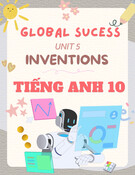

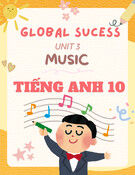
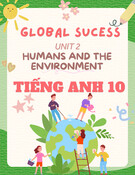




![Giáo án Tiếng Anh 10 Friends Global Unit 1: Feelings (Cảm Xúc) [Mới Nhất]](https://cdn.tailieu.vn/images/document/thumbnail/2025/20250807/hoangphuc03/135x160/140_giao-an-tieng-anh-10-friends-global-unit-1-feelings.jpg)
